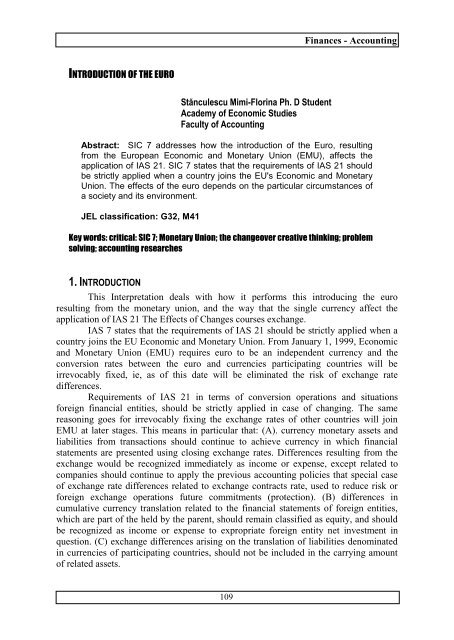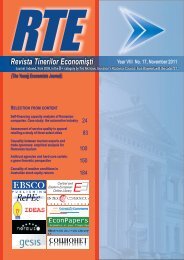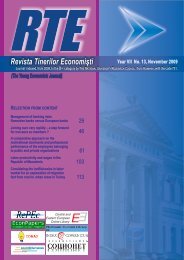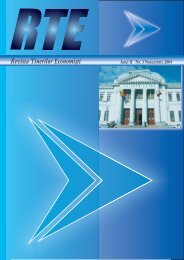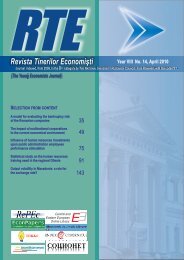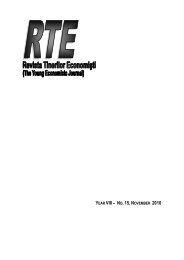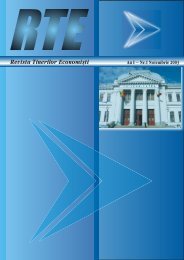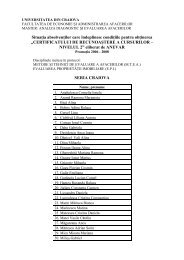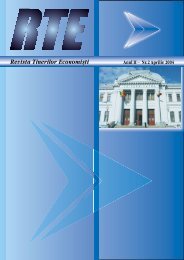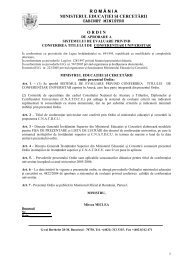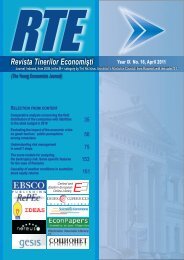View - Centru E-learning de Instruire al Resurselor Umane din ...
View - Centru E-learning de Instruire al Resurselor Umane din ...
View - Centru E-learning de Instruire al Resurselor Umane din ...
You also want an ePaper? Increase the reach of your titles
YUMPU automatically turns print PDFs into web optimized ePapers that Google loves.
Finances - AccountingINTRODUCTION OF THE EUROStănculescu Mimi-Florina Ph. D Stu<strong>de</strong>ntAca<strong>de</strong>my of Economic StudiesFaculty of AccountingAbstract: SIC 7 addresses how the introduction of the Euro, resultingfrom the European Economic and Monetary Union (EMU), affects theapplication of IAS 21. SIC 7 states that the requirements of IAS 21 shouldbe strictly applied when a country joins the EU's Economic and MonetaryUnion. The effects of the euro <strong>de</strong>pends on the particular circumstances ofa society and its environment.JEL classification: G32, M41Key words: critic<strong>al</strong>: SIC 7; Monetary Union; the changeover creative thinking; problemsolving; accounting researches1. INTRODUCTIONThis Interpretation <strong>de</strong><strong>al</strong>s with how it performs this introducing the euroresulting from the monetary union, and the way that the single currency affect theapplication of IAS 21 The Effects of Changes courses exchange.IAS 7 states that the requirements of IAS 21 should be strictly applied when acountry joins the EU Economic and Monetary Union. From January 1, 1999, Economicand Monetary Union (EMU) requires euro to be an in<strong>de</strong>pen<strong>de</strong>nt currency and theconversion rates between the euro and currencies participating countries will beirrevocably fixed, ie, as of this date will be eliminated the risk of exchange ratedifferences.Requirements of IAS 21 in terms of conversion operations and situationsforeign financi<strong>al</strong> entities, should be strictly applied in case of changing. The samereasoning goes for irrevocably fixing the exchange rates of other countries will joinEMU at later stages. This means in particular that: (A). currency monetary assets andliabilities from transactions should continue to achieve currency in which financi<strong>al</strong>statements are presented using closing exchange rates. Differences resulting from theexchange would be recognized immediately as income or expense, except related tocompanies should continue to apply the previous accounting policies that speci<strong>al</strong> caseof exchange rate differences related to exchange contracts rate, used to reduce risk orforeign exchange operations future commitments (protection). (B) differences incumulative currency translation related to the financi<strong>al</strong> statements of foreign entities,which are part of the held by the parent, should remain classified as equity, and shouldbe recognized as income or expense to expropriate foreign entity net investment inquestion. (C) exchange differences arising on the translation of liabilities <strong>de</strong>nominate<strong>din</strong> currencies of participating countries, should not be inclu<strong>de</strong>d in the carrying amountof related assets.109


